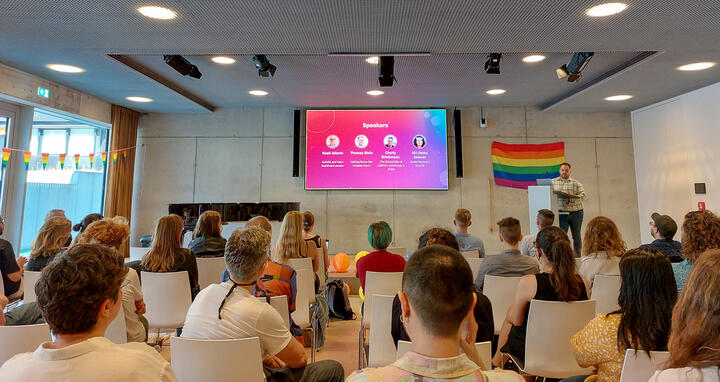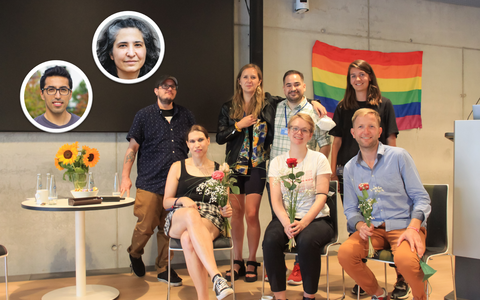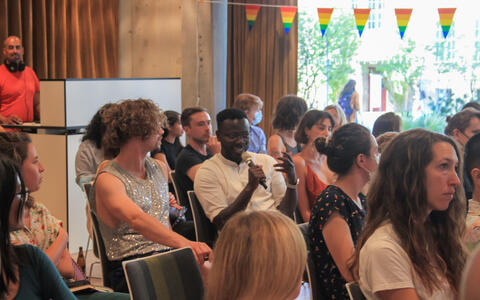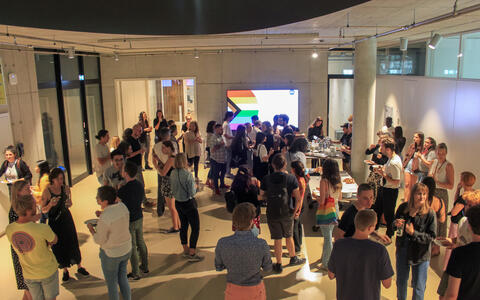Pride@MDC – Follow the rainbow
On 22nd July, at the Max Delbrück Center for Molecular Medicine (MDC) for the first time the LGBTQ+ community and their supporters met to network and foster better visibility. The initiative for the Pride symposium came from Jacobo López Carballo, PhD student at the Gotthardt lab, who organized the symposium together with Christian Feregrino, Lieke van de Haar and Tijana Perovic. The abbreviation LGBTQ+ stands for Lesbian, Gay, Bisexual, Trans and Queer. Q was only added in the 2000s and depicts further facets of gender identities. The plus (sometimes also an asterisk) stands for other forms, such as pan-, inter- or asexuality, whereby the last two terms are sometimes mentioned separately (LGBTQIA+).
Organizers and Speakers at the Pride Symposium (from left to right): Christian Feregrino, Ahi Issever, Noah Adams, Sofia Forslund, Tijana Perovic, Jacobo López Carballo, Charly Brinkmann, Lieke van de Haar und Thomas Stein.
The ‘sold-out’ meeting, which took place in the conference room of the Berlin Institute for Medical Systems Biology of MDC (BIMSB), started with Jacobo López Carballo giving an overview of the legal framework around LGBTQ+ rights worldwide. While some countries face the death penalty for same-sex love, elsewhere LGBTQ+ people can marry and adopt children. Jacobo also outlined the history of the first homosexual movement in Berlin, from the late 19th century to 1933. "This will not be the last Pride symposium at our institute," he said after his presentation, giving a hint that he wants to start another little history of Berlin: the history of LGBTQ+ visibility at the MDC. As the broad support for the symposium shows, the doctoral student will be able to count on a lot of allies for this endeavor.
The MDC under the sign of the rainbow
The MDC flew the rainbow flag for the first time last week. During the CSD on Saturday, the flag also premiered at the German Bundestag, the banner could be seen fluttering in the wind from one of its towers as a sign of solidarity. Flying a rainbow flag is by no means trivial, as emphasized by Dr. Ahi Sema Issever during her talk. She is the local women's and equal opportunities commissioner at the Charité - Universitätsmedizin Berlin and reported on the experiences of the queer network, which has existed since 2018. At that time there were still major hurdles to be overcome: the decision-makers did not want to be responsible for hoisting a rainbow flag for more than two days and at more than one of the four clinic locations. They explained that for this to happen the board of directors would need to be involved, and so initially it was only up for two days. The fact that this year the flag could easily be seen at all locations throughout the entire Pride month (as was also the case at the MDC) is certainly a merit of the network, which is dedicated to making queer topics more visible in the clinics, research and teaching. Whether a similar network will form at the MDC remains exciting. Dr. Sofia Forslund, Junior PI at the MDC and ECRC, is sure that the symposium created the right momentum: “The organizational process of the symposium was based on a bottom-up process, but with top-down support. And both are required to increase visibility and inclusion,” she said.
Why LGBTQ+ visibility matters
One of the questions from the audience was how to support LGBTQ+ causes as an individual.
How centrally important visibility is was one of the main topics of the symposium, both during the lectures and at the panel discussion at the end. Dr. Thomas Stein, a demographer at Charité, gave insights into how difficult it is to collect demographic data on visibility. Same-sex couples are virtually invisible in most countries because in the census questions in this regard are not explicitly asked. Canada, Brazil, Uruguay, Sweden and New Zealand are among the few countries that ask this directly – Germany is not among them. "Nevertheless, you can still extrapolate relevant data," the expert explains, "for example, in Germany the census asks whether you live in a partnership and also whether you live with your partner in the same household. If both questions are answered with yes by two same-sex people from a household one can conclude that it is indeed a same-sex couple.”
Charly Brinkmann, PhD student at the Leibniz Institute for Vegetable and Ornamental Crops (IGZ) and member of the LGBTQ+ STEM Berlin network (STEM stands for Science, Technology, Engineering, Mathematics), presented studies showing that LGBTQ+ people publish more scientific papers when they don't hide their identity at work. Better visibility and good networks at scientific institutions can therefore have a direct positive influence on the number of publications that a scientific institution generates.
Inclusion and diversity
LGBTQ+ people are not the only ones who are at a systemic disadvantage. Many women share similar experiences, as do people with a migration background or members of different ethnic groups. Noah Adams, a teaching assistant at the University of Toronto, shared how difficult it can be to belong to more than one potentially disadvantaged group. He spoke about a subject on which he has not only written a book, but that also forms the basis of his PhD thesis in adult education and community development: trans people who are also autistic. Most studies are primarily clinical and rarely socio-economic in nature. They, therefore, hardly show the social problems of this minority, yet there are plenty of them. Even countries that have specialized trans health care providers often require psychological assessments to access them. This can potentially include the requirement of a “cure” from autism, despite the fact that it is controversial whether autism needs to be treated per se. For people facing multiple facets of discrimination such things can present serious obstacles to developing their full potential, Adams explained.
LGBTQ+ is a topic that affects everyone
Changes, such as the legal recognition of LGBTQ+ lifestyles through laws on gay marriage or anti-discrimination paragraphs, have recently been introduced in several countries after many years of struggle for recognition and equality, sometimes surprisingly fast. Conversely, there is also the danger that such rights could be revoked quickly. This became particularly clear during the panel discussion. “Lack of visibility can also create a kind of minority stress, a feeling of not belonging, which drains energy and reduces productivity,” said Sofia Forslund. Everyone present agreed that an active LGBTQ+ presence in society is important and that supporters, who may not be part of the LGBTQ+ community themselves, but allies, are also needed.
The organizers were extremely pleased that numerous allies took part in the symposium, out of interest and solidarity. There was more than one question from the audience as to what one could do as an individual to support LGBTQ+ causes. In addition to general moral courage, it's often small things like using pronouns in your own email signature, Noah Adams and Charly Brinkmann explained in unison. For most people, this may not seem necessary at first glance, but it could encourage trans or gender fluid people to do so without feeling like outsiders. "For my part, I will take this suggestion to heart and adjust my signature," said one attendee at the subsequent Pride Beer Hour. Inclusion would affect everyone and not just minorities. "It only works if it comes from the majority." The aim of the Pride symposium making MDC a more inclusive, more colorful and more diverse institute already seems to be bearing fruit.
Visitors of the Pride Symposium in exchange with each other.
Text: Andreas Ofenbauer
Further information
- LGBTQ+ STEM Berlin
- QueerNetwork at the Charité
- Diversity and Inclusion at Helmholtz
- Report of Institute of Physics, Royal Astronomical Society and royal society of chemistry
- Nature: LGBTQ scientists are still left out
- PLOS ONE: Nondisclosure of queer identities is associated with reduced scholarly publication rates
- Human Dignity Trust Website








